
Women on the agenda in Leiden
Women are are on the agenda again at Leiden University. That was clear on 8 March in the Academy Building. First there was an informal get-together with women professors and talented researchers, followed by the 27th Annie Romein-Verschoor lecture, on happy and angry women.
Chatting over drinks
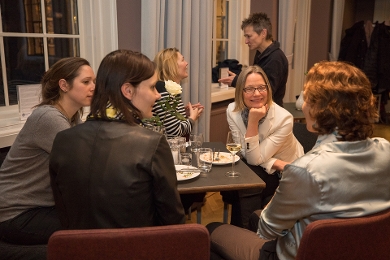
Bijl
'This is where the happy women are,' said Professor of Classical Languages Ineke Sluiter, winner of the Spinoza Prize and the Prize for Academy Professors, at the informal session in the restaurant of the Faculty Club. Sluiter was referring to the fact that the women invited to the meeting have generally made it to professor or have received particular recognition in the form of a subsidy or an award.
Open Research Area subsidy
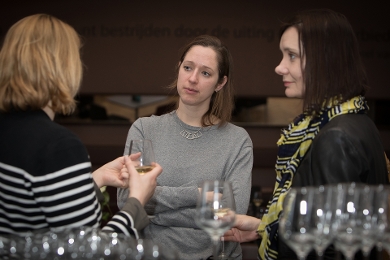
The new Professor of Anthropology, Cristina Grasseni - since 1 February - came to Leiden via Harvard and Utrecht and indeed she has no complaints about a glass ceiling. Another happy attendee is Anna van Duijvenvoorde, professor in the Neurocognitive Development Psychology group headed by Eveline Crone. At the age of 33, Van Duijvenvoorde is already a senior researcher, and she has just received a substantial Open Research Area subsidy from NWO, intended for international collaboration. She is aware of the gender difference and does her best to minimise it. She has some valuable advice: 'Don't be too modest, and make sure you position yourself at the right level in the market: promote yourself; claim the credits that you deserve; watch out for your own biases - everyone has male-female prejudices, including you; learn to bounce back from disappointments. Promoting myself is something I've learned a lot about over the past few years.'
|
% women |
2012 |
2013 |
2014 |
2015 |
2016 |
|
Professor |
19.7% |
21.0% |
23.3% |
24.3% |
24.8% |
Growth in the number of female professors at Leiden University
Leidsen ambitions
The get-together for women researchers before the Annie Romein-Verschoor lecture is a continuation of the initiative 'Room for women!', which was organised last year on International Women's Day. Vice-Rector Hester Bijl wants to become an annual tradition. She also has ambitions to raise the proportion of women professors. 'At the moment we're in the lead in the Netherlands, with 24%, but we're not satisfied yet. We want to get to 28% in 2019 and then maybe 30% by 2020. Right now, of the newly appointed professors, 30% are women. We expect to get ten of the hundred extra women professors that the Ministry of Education is funding. That helps. We also need to look at the post of Scientific Director, and keep our eyes on the talented candidates we have in the pipeline; it's looking promising. At the moment we have more women professors than PhD candidates.' This is definitely challenging the idea that the higher up the career ladder you go, the fewer women there are.
Annie Romein-Verschoor lecture
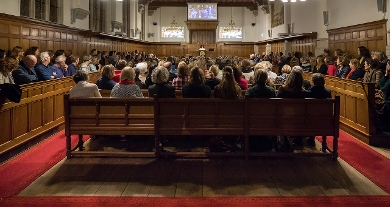
The speaker at the Annie Romein-Verschoor lecture was journalist and publicist Sheila Sitalsing, who was introduced by Aminata Cairo, policy officer at Leiden University's Diversity Office.
Annemiek Ottenhof
Sitalsing talked about Annemiek Ottenhof, from Breda, who wrote a carnival song about the anti-immigration movement. The song quickly became an internet hit and Ottenhof has been a guest in many TV and radio programmes. ‘But, it was intended as a bit of fun,' Sitalsing stated. 'Nobody is in the least interested in what motivates her or in her story. It's a story of divorce, job loss, social benefits and poverty. And it's also about the foundation she started.'
30% have reason to be pessimistic
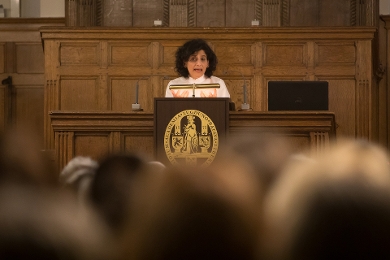
Through the foundation she has set up, Ottenhof strives for people who are 'too rich for the foodbank but too poor to be able to eat properly every day.' And that's a fact, Sitalsing stresses. Social security has become more austere, but work in't always the panacea. For someone like Ottenhof, work means dead-end jobs with on-call contracts. Together with the precariat, the opposite end of the spectrum to the privileged top layer of society that lacks for nothing, this group of working people makes up 30% of the population. Do the women in this group have reason to be angry? Yes, they do.
Highly educated women also at risk
Anyone who thinks that the generation of girls now growing up will be fine because they are keen to learn, they drop out less and they are better educated than the boys, is wrong: they start straight off working part time, are often more economically dependent and less positive about their career prospects and are more likely to have a temporary contract or work via an employment agency. 'The Netherlands is just about the most backward country in the EU in this respect,' said Sitalsing. Women run more risks, particularly if they divorce. Can highly educated women with a good job really think about what the poor want or need? And not only that, in our participation society is that pot of soup ever delivered to a neighbour in need by a man rather than a woman? Women aren't even equally represented in parliament. A good job for the women's movement is to reach out to women on the wrong site of the education divide.
Stories
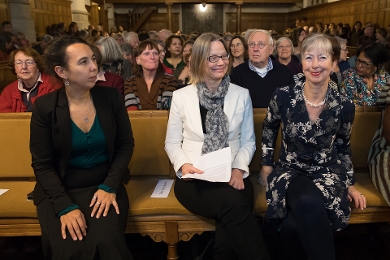
Romein-Verschoor committee: Judi Mesman (l) and Greta Nordenbos, with the Vice-Rector (centre).
Do women have specific reasons to be angry? Aminata Cairo believes they do. As an anthropologist, she is interested in women's stories. Take Barbados, for example, where women have such jobs as so-called secretaries, but spend all day typing screeds of data at very low rates of pay. The work is in the process of being automated,with scans taking the place of the typed entries, which means that the women will be kicked out and replaced by men, who can obviously do the scanning better. All this has an effect on the women.
White women voting for Trump is no surprise
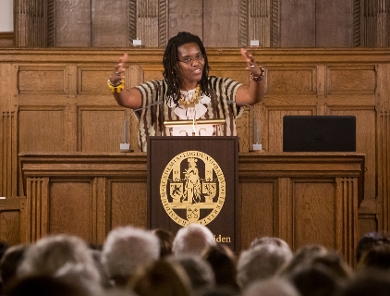
‘And now I'll take you to the America of Trump.' Cairo found it no surprise that the majority of white women voted for Trump. Since 2004, when the first studies were carried out, white women have always voted for the Republican candidate. Why is that? Because white women have always regarded men as their protectors, they have internalised the patriarchal system. They do what they think is good for their husband and sons, and they themselves disappear from view. You see the opposite picture with black women, who mainly vote democratic.
If necessary, sing
Women have many reasons to be angry. 'Recognise your anger and allow yourself and other women to see it!' Cairo said. 'Women have to regain their confidence and their dignity. Don't avoid it or hide it away; try to do something with it. If necessary, sing!' And in her beautiful voice, she sings a song. A different protest song from Annemiek Ottenhof. We have come full circle.
(CH)
Athena’s Angels
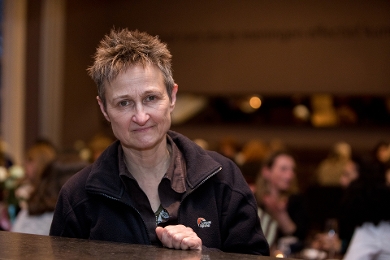
Ineke Sluiter is one of the four initiators of Athena's Angels, a group of femals professors whose aim is to get more women in higher academic positions and to put anti-female discrimination on the agenda. She reported that NWO has asked organisational psychologist Naomi Ellemers (first in Leiden and now in Utrecht) to develop training courses for the committees that assess research proposals, to exclude male/female prejudices as far as possible. 'The initiative came from NWO, which is great. It all starts with awareness.'
The Angels' website has many - often shocking - examples of female discrimination. Sluiter shared an anecdote with the audience. A short while ago she was invited to give a lecture at an all-male meeting. One of the men came up to her and asked: 'Are you here to arrange the coffee?' He was so embarrassed when he discovered that she was the speaker! But Sluiter is well aware that women too have male/female prejudices.
